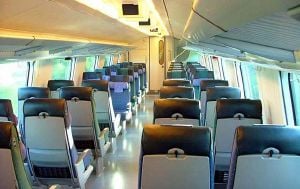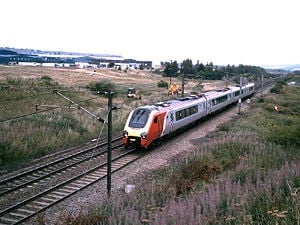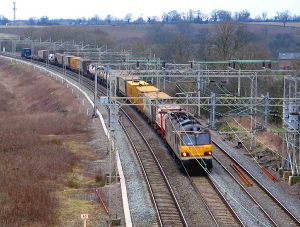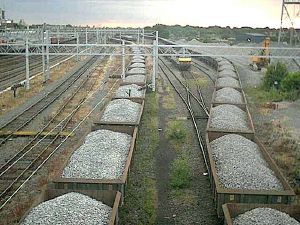Train
In rail transport, a train consists of rail vehicles that move along guides to transport freight or passengers from one place to another. The guideway usually consists of conventional rail tracks, but might also be monorail or other types of guideways. Propulsion for the train is provided either by a separate locomotive, or from motors in self-propelled multiple units. Today trains are powered by diesel engines or by electricity supplied by trackside systems. Historically, the steam engine was the dominant form of locomotive power through the mid-twentieth century, but other sources of power (such as horses, rope (or wire), gravity, pneumatics, or gas turbines) are possible.
The Atchison, Topeka and Santa Fe Railway's 1948 operating rules define a train as: "An engine or more than one engine coupled, with or without cars, displaying markers."[1]
History of the train
At first, trains carried freight only. In 1825 the Stockton and Darlington Railway in England started to operate regular services for passengers. George Stephenson designed a steam locomotive called "Locomotion" to pull passenger cars. On September 27,1825, the locomotive was used to pull a special train to mark the first steam-hauled public railroad. Tom Thumb, built in 1829 first ran in 1830 on the Baltimore and Ohio railroad to Ellicots Mill, Maryland. This was the first public railroad in the United States. More trains meant more locomotives. The Orient Express is the world’s most famous train. The largest trains ever built were "Big Boys." They were in service between 1941 and 1944.They carried enormous freight trains that weighed about 3,960 tons. They also went up steep slopes in the Rocky Mountains. The locomotive and tender were almost 131 feet long and 16 feet high. They weighed some 594 tons and could run up to 80 miles per hour. The last stake was driven in at Promontory, Utah for the Continental railroad, which stretched all the way across America.
Trains in America: timeline (source: aar.org)
1797 The steam locomotive is invented in England. 1827 The first railroad in North America — the Baltimore & Ohio — is chartered by Baltimore merchants. 1830 The first regularly scheduled steam-powered rail passenger service in the U.S. begins operation in South Carolina, utilizing the U.S.-built locomotive "The Best Friend of Charleston." 1833 A total of 380 miles of rail track are in operation in the U.S. 1838 Five of the six New England states have rail service, as do such frontier states as Kentucky and Indiana. 1840 More than 2,800 miles of track are in operation. 1850 More than 9,000 miles of track are in operation in the U.S., as much as in the rest of the world combined. 1860 More than 30,000 miles of track are in operation in the U.S. 1861-1865 The Civil War becomes the first major conflict in which railroads play a major role as both sides use trains to move troops and supplies. 1862 President Abraham Lincoln signs the Pacific Railroad Act for the construction of the transcontinental railroad that will ultimately link California with the rest of the nation. 1865 The "golden age" of railroads begins. For nearly half a century, no other mode of transportation challenges railroads. During these years, the rail network grows from 35,000 to a peak of 254,000 miles in 1916. 1869 On May 10, at Promontory, in the Utah Territory, the "Golden Spike" joins the Union Pacific and Central Pacific railroads, marking completion of the first transcontinental railroad. 1872-1945 Presidents from Ulysses S. Grant to Franklin D. Roosevelt travel largely by train. For them, as for virtually every American, the railroad offers the fastest, safest means of travel. 1917 The federal government seizes control of the railroads for the duration of World War I. By the time they are returned to private ownership in 1920, they are in seriously run-down condition and in need of substantial maintenance and improvement. 1900-1940 Other modes of transportation grow from small beginnings to challenge rail dominance over freight and passenger transportation. By the eve of World War II, automobiles, large buses, trucks, planes and pipelines — supported by government subsidies and less burdened by regulation than railroads — have become full-fledged competitors to railroads. 1929-1940 The Great Depression exacts a heavy toll on the railroad industry, forcing substantial segments of the industry into bankruptcy. 1941-1945 Railroads remain under private control during World War II and move on average twice the monthly volume of both freight and passengers as during World War I. 1945-1970 Railroads enter the post-war era with a new sense of optimism that leads them to invest billions of dollars in new locomotives, freight equipment and passenger trains. That investment would see retirement of the last steam locomotive by the late 1950s in favor of diesel engines. In spite of this modernization, the decline in rail market share that began before the war resumes. 1945-1953 President Harry S Truman is the last "railroad President." His successors will rely mostly on planes and automobiles, using trains largely for campaign trips. 1955 Inter-modal freight — the movement of containers and highway trailers by rail — is reported as a separate category of freight for the first time. In that year, railroads moved 168,000 carloads of trailers and containers. 1970-1975 Burdened by regulation and faced with subsidized competition, nine Class I railroads, representing almost one-quarter of the industry's trackage, file for bankruptcy protection. 1970 The Rail Passenger Service Act of 1970 creates Amtrak to take over intercity rail passenger service. Amtrak officially begins service on May 1, 1971. 1980 The Staggers Rail Act reduces the Interstate Commerce Commission's regulatory jurisdiction over railroads and sparks competition that stimulates advances in technology and a restructuring of the industry, including creation of hundreds of new short line and regional railroads. 1987 Conrail is privatized in what — at that time — was the largest share offering in U.S. history as investors pay $1.9 billion to buy shares in the railroad. 1998 U.S. freight railroads move 1.38 trillion ton-miles of freight, more than ever before, setting new safety records in the process.
Types of trains
There are various types of trains designed for particular purposes.
A train can consist of a combination of one or more locomotives and attached railroad cars, or a self-propelled multiple unit (or occasionally a single powered coach, called a railcar). Trains can also be hauled by horses, pulled by a cable, or run downhill by gravity.
Special kinds of trains running on corresponding special 'railways' are atmospheric railways, monorails, high-speed railways, Dinky Trains, maglev, rubber-tired underground, funicular, and cog railways.
A passenger train may consist of one or several locomotives, and one or more coaches. Alternatively, a train may consist entirely of passenger carrying coaches, some or all of which are powered as a "multiple unit". In many parts of the world, particularly Japan and Europe, high-speed rail is utilized extensively for passenger travel.
Freight trains comprise wagons or trucks rather than carriages, though some parcel and mail trains (especially Travelling Post Offices) are outwardly more like passenger trains.
In the United Kingdom, a train hauled by two locomotives is said to be "double-headed," and in Canada and the United States it is quite common for a long freight train to be headed by three, four, or even five locomotives. A train with a locomotive attached at each end is described as 'top and tailed,' this practice typically being used when there are no reversing facilities available. Where the second locomotive is attached temporarily to assist a train up steep banks (or down them by providing braking power), it is referred to as 'banking.'
Trains can also be mixed, hauling both passengers and freight. Such mixed trains became rare in many countries, but were commonplace on the first nineteenth-century railroads.
Special trains are also used for Track Maintenance; in some places, this is called maintenance of way.
Motive power
The first trains were rope-hauled, gravity powered or pulled by horses, but from the early nineteenth century almost all were powered by steam locomotives. From the 1920s onwards they began to be replaced by less labour intensive and cleaner (but more expensive) diesel locomotives and electric locomotives, while at about the same time self-propelled multiple unit vehicles of either power system became much more common in passenger service. Most countries had replaced steam locomotives for day-to-day use by the 1970s. A few countries, most notably the People's Republic of China, where coal and labour are cheap, still use steam locomotives, but this is being gradually phased out. Historic steam trains still run in many other countries, for the leisure and enthusiast market.
Electric traction offers a lower cost per mile of train operation but at a very high initial cost, which can only be justified on high traffic lines. Since the cost per mile of construction is much higher, electric traction is less favored on long-distance lines. Electric trains receive their current via overhead lines or through a third rail electric system.
Passenger trains
Passenger trains have passenger cars, and travel between stations. The distance between stations may vary from under six-tenths of a mile to much more. Long-distance trains, sometimes crossing several countries, may have a dining car or restaurant car. They may also have sleeping cars, but not in the case of high-speed rail. These arrive at their destination before the night falls and are in competition with airliners in speed. Very long distance trains, such as those on the Trans-Siberian railway, are usually not high-speed.
Very fast trains sometimes tilt, like the Pendolino or Talgo. Tilting is a system where the passenger cars automatically lean into curves, reducing the centrifugal forces acting on passengers and permitting higher speeds on curves in the track with greater passenger comfort.
The Pendolino is an Italian family of tilting trains used in Italy, Spain, Portugal, Slovenia, Finland, the Czech Republic, United Kingdom, Switzerland, and China. It was developed and manufactured by Fiat Ferroviaria, which was taken over by Alstom in 2002. Talgo is a Spanish manufacturer of railway vehicles. It is best known for a design of articulated railway passenger cars in which the wheels are mounted in pairs, but not joined by an axle, and being between rather than underneath the individual coaches. Another feature of the design is the suspension, which allows the vehicle to passively tilt into curves, aiding passenger comfort.
For trains connecting cities, we can distinguish inter-city trains, which do not halt at small stations, and trains that serve all stations, usually known as local trains or "stoppers," and sometimes an intermediate kind, the so-called limited-stop).

For shorter distances many cities have networks of commuter trains, serving the city and its suburbs. Some carriages may be laid out to have more standing room than seats, or to facilitate the carrying of prams, cycles, or wheelchairs. Some countries have some double-decked passenger trains for use in conurbations. Double-deck, high-speed, and sleeper trains are becoming more common in Europe.
Passenger trains usually have emergency brake handles (or a "communication cord") that the public can operate. Abuse is punished by a heavy fine.
Large cities often have a metro system, also called underground, subway, or tube. The trains are electrically powered, usually by third rail, and their railroads are separate from other traffic, without level crossings. Usually they run in tunnels in the city center, and sometimes on elevated structures in the outer parts of the city. They can accelerate and decelerate faster than heavier, long-distance trains.
A light one- or two-car rail vehicle running through the streets is by convention not considered a train, but rather a tram, trolley, light-rail vehicle, or streetcar, but the distinction is not always strict. In some countries, such as the United Kingdom, the distinction between a tramway and a railway is precise and defined in law.
The term light rail is sometimes used for a modern tram, but it may also mean an intermediate form between a tram and a train, similar to metro, except that it may have level crossings. These are often protected with crossing gates, and may also be called a trolley.
Maglev trains and monorails represent minor technologies in the train field.
The term rapid transit is used for public transport such as commuter trains, metro, and light rail. However, in New York City, lines on the New York City Subway have been referred to as "trains."
Some commuter trains in Tokyo, Japan have special cars in which the bench seats fold up to provide standing room only during the morning rush hour (until 10 a.m.). The E231 series train has two of these cars in each set (Usually 10 or 11cars per set), officially nicknamed "roku-tobira-sha" (literally, "6 door car") — all the other cars have four sets of doors on each side.
An estimated 3.5 million passengers ride on Tokyo's Yamanote Line every day, with its 29 stations. For comparison, the New York City Subway carries 4.8 million passengers per day on 26 lines serving 468 stations.
Freight trains
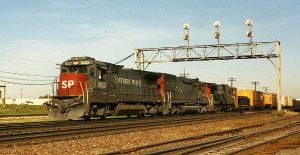
Freight trains have freight cars. Much of the world's freight is transported by train. In the USA the rail system is used mostly for transporting cargo (or freight).
Under the right circumstances, transporting freight by train is highly economic, and also more energy efficient than transporting freight by road. Rail freight is most economic when freight is being carried in bulk and over long distances, but is less suited to short distances and small loads. Bulk aggregate movements of a mere 20 miles can be cost effective even allowing for trans-shipment costs. These trans-shipment costs dominate in many cases and many modern practices, such as container freight, are aimed at minimizing these.
The main disadvantage of rail freight is its lack of flexibility. For this reason, rail has lost much of the freight business to road competition. Many governments are now trying to encourage more freight onto trains, because of the environmental benefits that it would bring.
There are many different types of freight trains, which are used to carry many different kinds of freight, with many different types of wagons. One of the most common types on modern railways are container trains, where containers can be lifted on and off the train by cranes and loaded off or onto trucks or ships.
This type of freight train has largely superseded the traditional boxcar type of freight train, with which the cargo has to be loaded or unloaded manually.
In some countries "piggyback" trains are used: trucks can drive straight onto the train and drive off again when the end destination is reached. A system like this is used on the Channel Tunnel between England and France, and between France and Italy (Modalohr, road-trailer carriers). Piggyback trains are the fastest growing type of freight trains in the United States, where they are also known as 'trailer on flatcar' or TOFC trains. There are also some "inter-modal" vehicles, which have two sets of wheels, for use in a train, or as the semi-trailer of a road vehicle. However, such a loading method is now obsolete; the current semi-trailers have road wheels only and are carried on specially adapted trucks when moving on rails.
There are also many other types of wagons, such as "low loader" wagons for transporting road vehicles. There are refrigerator cars for transporting foods such as ice cream. There are simple types of open-topped wagons for transporting minerals and bulk material such as coal, and tankers for transporting liquids and gases. Today, however, most coal and aggregates are moved in hopper wagons that can be filled and discharged rapidly, to enable efficient handling of the materials.
Freight trains are sometimes illegally boarded by passengers who do not wish, or do not have the money, to travel by ordinary means. This is referred to as "hopping," and is considered by some communities to be a viable form of transport. Most hoppers sneak into train yards and stow away in boxcars. More bold hoppers will catch a train "on the fly," that is, as it is moving, leading to occasional fatalities.
Notes
- ↑ Atchison, Topeka and Santa Fe Railway (1948). Rules: Operating Department, p 7.
ReferencesISBN links support NWE through referral fees
- Rhodes, Michael. North American Railyards, MBI, 2003. ISBN 978-0760315781
- Yenne, Bill. Atlas of North American Railroads, MBI, 2005. ISBN 978-0760322994
- Daniels, Randolph. Trains Across the Continent: North American Railroad History, Indiana University Press, 200. ISBN 978-0253214119
- Stanford, Les. Last Train to Paradise: Henry Flagler and the Spectacular Rise and Fall of the Railroad that Crossed an Ocean, Three Rivers Press, 2003. ISBN 978-1400049479
- Loving, Rush. The Man Who Loved Trains: The Story of Men Who Battled Greed to Save an Ailing Industry, Indiana University Press, 2006. ISBN 978-0253347572
External links
- High Speed Train
- Trainorders.com - Focus on trains of North America
- Royal Engineers Museum - Transportation
- Historic Trains Quality collection of old train photographs
- List of Railway Movies (as of December 5, 1994).
| Rail transport |
|---|
| Operations |
| Stations |
| Trains |
| Locomotives |
| Rolling stock |
| History |
| Terminology |
| By country |
| Disasters |
|
Modelling |
Credits
New World Encyclopedia writers and editors rewrote and completed the Wikipedia article in accordance with New World Encyclopedia standards. This article abides by terms of the Creative Commons CC-by-sa 3.0 License (CC-by-sa), which may be used and disseminated with proper attribution. Credit is due under the terms of this license that can reference both the New World Encyclopedia contributors and the selfless volunteer contributors of the Wikimedia Foundation. To cite this article click here for a list of acceptable citing formats.The history of earlier contributions by wikipedians is accessible to researchers here:
The history of this article since it was imported to New World Encyclopedia:
Note: Some restrictions may apply to use of individual images which are separately licensed.



